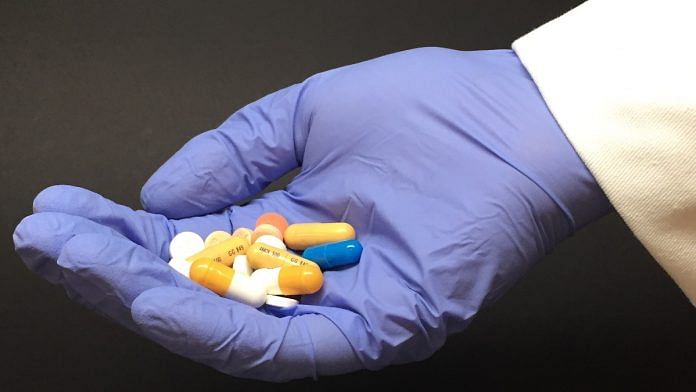New Delhi: For the first time in India, defective or adulterated drugs can be recalled even if they reach the market at large. The new mandate is part of the changes in the Drugs and Cosmetics Rules, 1945 notified by the Union health ministry for strictly ensuring good manufacturing practices (GMP) in the pharmaceutical sector.
The changes in the Schedule M, which deals with the GMP requirement for pharmaceutical manufacturers, of the Rules were notified on 28 December.
The latest changes come in the backdrop of a number of episodes involving India-made drugs, especially cough and cold syrups, being linked with adverse events including deaths in several countries, purportedly due to contamination with harmful chemicals.
In September, ThePrint had reported that the government was working to make GMP norms more thorough for drugmakers. These norms are mandatory standards which build and bring quality into product by way of control on materials, methods, machines, processes, personnel, and facility or environment.
A senior ministry official explained that some of the major changes which will happen to support upgradation of the units are introduction of Pharmaceutical Quality System (PQS), Quality Risk Management (QRM), Product Quality Review (PQR), and Qualification and Validation of equipment.
Under PQS, the manufacturers will be required to assume the responsibility for the quality of the pharmaceutical products to ensure that they are fit for their intended use, comply with the requirements of the licence and do not place patients at risk due to inadequate safety, quality or efficacy.
“The attainment of this quality objective is the responsibility of senior management and requires the participation and commitment of staff in different departments and at all levels within the company, the company’s suppliers and the distributors,” it says.
Also, the senior management will have the ultimate responsibility to ensure that an effective pharmaceutical quality system is in place, is adequately resourced, and that roles, responsibilities, and authorities are defined, communicated and implemented throughout the organisation.
The modified rules specify requirements related to self-inspection & quality audit team, supplier audit and approval, stability studies as per recommended climate condition, validation of GMP related computerised system and specific requirements for manufacturing of hazardous, biological products, radiopharmaceuticals and phytopharmaceuticals.
Sudarshan Jain, secretary general, Indian Pharmaceutical Alliance, a group of research based drugmakers, said that the revision of Schedule M by the government is a positive step and an important milestone for the Indian pharmaceutical sector.
This will elevate and update the quality standards of medicines, reinforcing the reputation of our industry and improving patient outcomes, he said, adding that the alliance welcomes this initiative propelling India’s journey to become a global benchmark in quality.
“The revised regulations of Schedule M will help ensure compliance with international quality standards and will benefit both patients and the industry by promoting the manufacturing of safe, effective, and high-quality drugs. The focus on risk management, qualification and validation of equipment, and self-inspection will be vital contribution.”
ThePrint has also reached out to the Indian Drug Manufacturers Association (IDMA), the network of generic drugmakers, for its comments on the new GMP norms. This report will be updated as and when a response is received.
Also Read: Govt sets deadline for pharma MSMEs to adopt good manufacturing practices. ‘Follow or be penalised’
Risk-based inspections revealed major lapses
According to the ministry, there are around 10,500 manufacturing units in the country out of which around 8,500 fall under the category of medium, micro and small enterprise (MSME).
India is a major exporter of medicines to low- and middle-income countries which require the World Health Organisation (WHO) GMP certification.
“We have around 2,000 units in the MSME category having WHO GMP certification,” says a note prepared by the ministry on the new GMP norms and seen by ThePrint.
The observations from ongoing risk-based inspections reiterated the need to have a relook at the GMP regulations, it said, adding that the Central Drugs Standard Control Organisation (CDSCO) has inspected 254 manufacturing units and 112 public testing labs, so far.
These inspections revealed poor documentation, lack of process and analytical validations, absence of self-assessment, quality failure investigation, internal product quality review, testing of incoming raw material and infrastructural deficiency to avoid cross-contamination, it said.
Also, the exercise has revealed the absence of professionally qualified employees, faulty design of manufacturing and testing areas.
“Based on the above factors and to keep pace with fast changing pharmaceutical manufacturing and quality domain, there was a necessity to revisit and revise the principles and concept of GMP mentioned in current Schedule M,” the ministry says.
“This would bring our GMP recommendations and compliance expectations at par with global standards, especially to those of WHO, and ensure production of globally acceptable quality of drug.”
The government also stressed that based on the discussion and recommendation of the drug technical advisory board under the drug regulator, a draft notification was issued in 2018 to upgrade and synchronise the Schedule M comparable to international standards.
A large number of comments and suggestions were received from stakeholders and after their review, the revised Schedule M was published.
To sensitise the stakeholders in advance regarding essentiality for GMP revision and its implementation, several workshops involving drug makers were held last year.
The changed Schedule M rules, the Centre said, will address most of the deficiencies related to documentation, failure investigation and technically qualified personnel “with the right person doing the right job”.
“It will support development of a robust quality management system in the company thereby enabling production of globally acceptable quality medicine,” it said.
Better quality management will help manufacturers grow their business nationally and internationally which is a huge opportunity for Indian pharmaceutical business, it added.
(Edited by Tony Rai)
Also Read: 2 cough syrups found ‘contaminated’, regulator launches probe into Gujarat drugmaker



